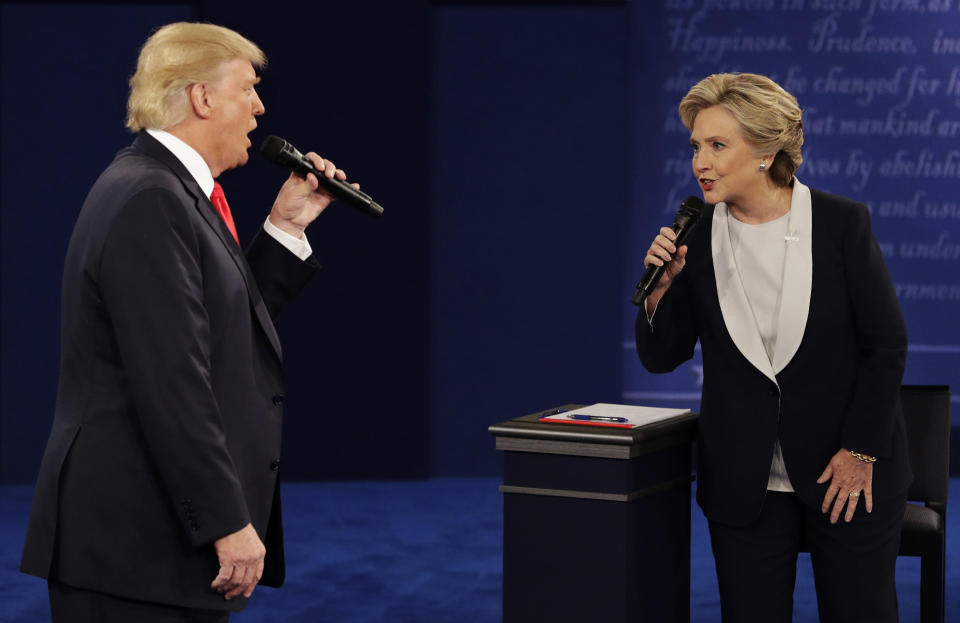Two 2020 Long Shots Exposed Hard Truths About Democrats' Foreign Policy
Rep. Tim Ryan (D-Ohio), who has just about 1% support nationwide in his bid for the 2020 Democratic presidential nomination, wasn’t expected to wow during the campaign’s first debate on Wednesday. He didn’t. But in one of the most dramatic moments of the night, he highlighted a key tension for the party as it decides how to battle President Donald Trump — and showed that Democrats have work to do if they hope to convince voters they are more trustworthy than Trump on issues of war and peace.
Late in the debate’s second hour, Ryan and Rep. Tulsi Gabbard (D-Hawaii) had a back-and-forth about the U.S. role in Afghanistan that exposed competing impulses within the party and the way many of its leaders haven’t yet talked frankly about how they will behave as a commander in chief.
Ryan argued — as many analysts and officials do — that, despite war-weariness after 18 years and many deaths, including two this week, some degree of U.S. presence in the country remains essential to preventing it from again becoming a hub for terrorists seeking to harm Americans. Gabbard, a veteran whose critique of traditional U.S. foreign policy is central to her political career, savaged Ryan as ill-informed, noting that militancy has a history in the country older than the U.S. mission there, and as callously irresponsible, talking about the sacrifices of soldiers like those with whom she served. (The Ryan campaign responded to Gabbard after the debate.)
The real point of contention went unmentioned, but that it was even alluded to this early in the 2020 campaign suggests it won’t be ignored: As president, would any Democrat really chart a new course on national security?
The fundamental problem is that almost every top Democrat has for years supported bringing home the U.S. troops in Afghanistan — and yet, once in power, Democrats have shied away from making that happen. It’s the old politician’s dilemma of making popular promises you’re not willing to keep. But as the party goes through some of its biggest ideological shifts in decades, it’s unclear that the excuses of deferring to expert wisdom and learning on the job will make up for under-delivering again and again — or whether they should.
Ryan’s approach to Afghanistan won’t satisfy the party’s surging left wing, yet his honesty about the fact that the argument over the country remains a live one should prompt some straight talk from other candidates who sell themselves as pro-withdrawal, such as top seed Sen. Elizabeth Warren (D-Mass.), who was on the stage Wednesday but remained silent throughout the Ryan-Gabbard exchange.
For President Barack Obama, strategic and political considerations ultimately trumped dovish promises. As a candidate, Obama was a sharp critic of the George W. Bush administration’s conduct of the fight against al Qaeda and other terrorist groups. Once in office, he became, according to New York Times reporter Scott Shane, “radicalized” in favor of controversial counterterror techniques, such as targeted killing, because he feared that a successful terrorist attack would make it impossible for him to enact his domestic agenda — or even make him a one-term president. In his second term, Obama cited counterterrorism concerns in reneging on his promise of a full withdrawal from Afghanistan and left 8,400 troops in the country on the advice of officials who noted the growing strength of the Taliban, the group that had sheltered al Qaeda ahead of the 9/11 attacks, and the Islamic State.

Any president faces similar calculations — and similar arguments, the kind that Ryan has likely heard in Congress ― for why campaign trail talk won’t become policy. The 2016 Democratic nominee, Hillary Clinton, who served in Obama’s cabinet as secretary of state, indicated that she too would sustain some American military support for the Afghan government in its years-long fight with the Taliban. And President Donald Trump, who called the U.S. invasion of Afghanistan a mistake and broadly bemoans U.S. troop deployments abroad, has boosted the number of American soldiers in the country and has permitted bigger counterterrorism attacks there even as he has approved peace talks with the Taliban that could result in the departure of U.S. forces.
Flush with hope and ready for drastic change, Democrats are having sincere and detailed arguments about issues from immigration to the climate crisis. Their approach to America’s behavior in the world and its effect on billions of people deserves an authentic conversation, too. The plan presidential contenders offer doesn’t have to be that of firebrand Gabbard or moderate Ryan — but it should be one that’s straightforward about what they are actually willing to do about demands like withdrawing from Afghanistan and what the real risks and benefits of those policies might be.
This story has been updated to include the Ryan campaign’s response.
Related Coverage
The Left's Ideas Dominated The First Democratic Primary Debate
Julián Castro Hammers 2020 Candidates Over Criminalization Of Immigrants
Democrats Spent Less Than 10 Minutes Talking About Climate Change At First 2020 Debate
Love HuffPost? Become a founding member of HuffPost Plus today.
This article originally appeared on HuffPost.

